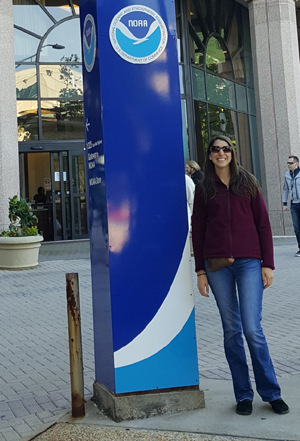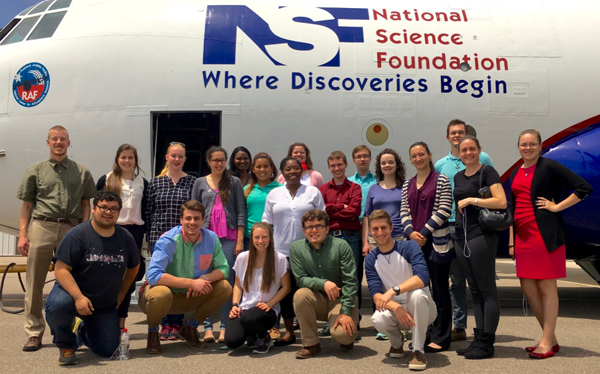Shaping a career in a week
Aspiring scientists find direction during Undergraduate Leadership Workshop
Jun 8, 2017 - by Staff
Jun 8, 2017 - by Staff
June 9, 2017 | When Christina Speciale was majoring in meteorology at Rutgers University, she knew she wanted to pursue a career in some aspect of the atmospheric sciences. But she wasn't sure what to focus on until she attended the Undergraduate Leadership Workshop (ULW) at the National Center for Atmospheric Research (NCAR) in the summer before her senior year.
At the weeklong event in 2010, she enjoyed making connections with meteorology students from other schools and hearing talks by leading NCAR scientists. Something in particular clicked when she saw a presentation by NCAR's Julie Demuth, a social scientist who does research into better communicating the uncertainty of weather forecasts to the public.
"That's a huge problem in our field," said Speciale, now a meteorologist with the National Weather Service in Albany, N.Y. "NCAR planted the seed for me on this issue, and to this day it's a big research interest of mine."
 Christina Speciale in front of the National Weather Service headquarters in Silver Spring, Maryland. (Photo courtesy Christina Speciale.)
Christina Speciale in front of the National Weather Service headquarters in Silver Spring, Maryland. (Photo courtesy Christina Speciale.)
Speciale is one of about 270 undergraduates from across the country who have attended the ULW since its inception in 2002. Every year, the workshop connects students in the atmospheric and related sciences with scientists, engineers, educators, and top managers, exposing them to research areas and career options while training them in leadership and professional skills.
So can a one-week workshop really make a difference to aspiring scientists? The answer is yes, according to a new study in the Bulletin of the American Meteorological Society.
A team of higher education experts with the University Corporation for Atmospheric Research (UCAR), which manages NCAR on behalf of the National Science Foundation, conducted an anonymous survey of past participants to see if the weeklong workshop had been helpful. The participants overwhelmingly answered that it had.
"Even if you don't do a research internship, a one-week program can provide career awareness and increased engagement in science, along with a sense of belonging and long-term professional support," said Valerie Sloan, a higher education specialist at UCAR and lead author of the study. "It can be enormously helpful to a student embarking on a career in the sciences."
NCAR launched the ULW program to help undergraduate students learn more about opportunities in the fields of atmospheric science and engineering. Studies have shown that many undergraduates don't have a full picture of career options, and not every student can land an internship or devote an entire summer to one in order to gain that knowledge.
To fill this gap, the ULW introduces about 20 students, most of them juniors, to various types of research at NCAR, as well as to options for graduate schools and careers in weather and climate. The workshop includes sessions on leadership skills and professional development, such as working in teams and communicating clearly. The participants then share the information with other atmospheric science students at their schools.
A total of 269 students from more than 70 universities have taken part.
To assess the impact of the workshop on student careers and better understand which program elements have been most helpful, Sloan and her co-authors designed an online survey and brought together focus groups of former students.
The survey, which had a response rate of 61 percent of those students for whom contact information was available, showed that the workshop had made a substantial impact on the participants. Some 98 percent of the survey respondents saw the program as a valuable or very valuable experience. In addition, 90 percent said the workshop "provided an experience that helped to prepare me professionally," 84 percent said it "increased my confidence in my ability to pursue my career," and 71 percent said it helped them "decide to go on to graduate school."
At least 75 percent have jobs in the atmospheric sciences, working in academia, government agencies, or private and nonprofit organizations. Several alumni are weather forecasters. One reported working as a pilot in the National Oceanic and Atmospheric Administration Corps, and another as a bathymetric scientist in the Naval Oceanographic Office.
 The Undergraduate Leadership Workshop introduces students to various aspects of the atmospheric sciences, including the role of research aircraft such as the NSF/NCAR C-130. (©UCAR. Photo by Valerie Sloan. This image is freely available for media & nonprofit use.)
The Undergraduate Leadership Workshop introduces students to various aspects of the atmospheric sciences, including the role of research aircraft such as the NSF/NCAR C-130. (©UCAR. Photo by Valerie Sloan. This image is freely available for media & nonprofit use.)
For some alumni, one of the most important aspects of the program is building confidence. "For the first time since high school, I am not afraid of my future," said one recent workshop participant after hearing from several professionals about their often-indirect career paths.
UCAR's Tim Barnes, an educational specialist who helped launch the workshop in 2002 and co-authored the new paper, said it has been gratifying to see how much it's helped aspiring scientists.
"One of the important aspects that we focus on is providing a safe space for the students to be vulnerable and ask questions – not just specific questions about science, but life questions as well," he said. "I think that's made a big difference. It's helped students think more about some major issues, like what's important to them and how they want their careers to unfold."
The paper concludes that a short workshop, while not as enriching as a summer internship that offers hands-on research, can nonetheless confer significant benefits. The workshops are particularly helpful if they include career information, conversations with scientists, team-building activities, and communication and leadership activities, the authors found.
"Based on these findings, we hope that workshops of this scale may be considered at other research centers or in atmospheric science programs so that more students can benefit from this type of training and support," the paper concludes.
The results come as no surprise to an alumnus of the first workshop in 2002. Joel Gratz applied to the workshop because, even after meteorology internships at a TV station and a research lab, he wanted to get a view of the entire spectrum of job opportunities in the atmospheric sciences. The experience introduced him to new directions in the field as well as helping him weed out options that did not excite him.
Gratz now runs his own weather company, OpenSnow.com, that issues weather forecasts and powder alerts for skiers and others looking for information about snow conditions across the northern hemisphere. He says the ULW and the American Meteorological Society's annual student conference are the two experiences, outside of the classroom, that were most useful and motivational during his undergraduate and graduate years.
"I wouldn’t be where I am today if it weren’t for these experiences," he said. "The ULW solidified my feeling that meteorology was the career for me while also identifying ways that I could impact the science."
Title: Long term Impacts of a Career Development Workshop for Undergraduates
Authors: Valerie Sloan, Rebecca Haacker, Tim Barnes, and Carolyn Brinkworth
Journal: Bulletin of the American Meteorological Society, DOI: 10.1175/BAMS-D-15-00214.1
David Hosansky, Manager of Media Relations